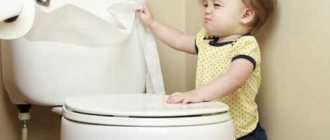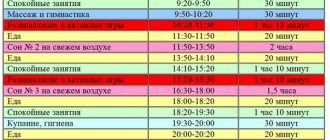Potty training
1. “It seems to me that the sooner I start teaching my baby to use the potty, the faster he will learn to do it. Is it so?"
You, like all parents, want only the best for your child and try to develop all his abilities as early as possible. But in such a matter as potty training, there is no need to rush. The sooner you start, the longer and more difficult this process will be for the child. After all, he will be able to control his bladder and bowels only when his body is sufficiently developed - on average at 18 months. And if you start learning at the right age, your child will learn much faster and easier and will be able to be proud of his achievement. And you will be proud of it!
2. “Is it true that if a baby wears disposable diapers all the time, in which he does not feel that he is wet, then it is more difficult to teach him to use the potty?”
Regardless of what diapers your baby wears or whether he wears them at all, he will learn to potty when his body is ready. This is confirmed by the results of studies that compared the behavior of two groups of children: in the first group, babies wore traditional gauze diapers from birth, and in the second, disposable diapers. In both groups, the age at which babies stopped completely needing diapers was exactly the same - an average of 27 months (E. Takanashi, 1988, Japan). Therefore, it is safe to say that the use of disposable dry-face diapers does not affect the ability of babies to learn to use the potty or the age at which they can do so.
3. “I’m afraid to put diapers on my 3-month-old son because I heard that due to the greenhouse effect they can lead to infertility.”
Firstly, the reproductive system in boys begins to develop only at 7-9 years of age. At the age of 7, sperm precursor cells appear, and the sperm themselves can be detected no earlier than at the age of 10, but as a rule, much later. From this it is clear that diapers cannot in any way affect the quality of sperm - boys at this age do not have it in principle. There are also a number of studies that confirm that disposable diapers do not create a greenhouse effect - the temperature under the diaper is practically no different from the skin temperature in regular diapers, and the humidity level under the diaper is much lower than when using diapers. Therefore, to summarize: disposable diapers and boys are compatible.
4. “My daughter is 1 year old. I know it’s still too early for her to be potty trained, but I’m really worried that we won’t have time to learn before kindergarten.”
No matter what age you start potty training your child, there is no guarantee that she will learn how to do it before kindergarten. After all, all children are potty trained at about the same time. Therefore, if you start training at an early age, this will not help speed up the process, but on the contrary, the training will be delayed - the child will not understand what they want from him, she will be upset because of this, and you too. And if you start when the child’s body is ready for this, then you and your baby will achieve success much faster and easier, and the child will already understand that this is his achievement and will be able to be proud of it.
5. “Many of my friends in the yard say that their babies go to potty at the age of 9, 8, and even 6 months. My daughter is 1 year old, I tried to teach her, but nothing works. Maybe I'm doing something wrong? Why can’t my child learn as quickly as other children?”
Tatyana, I understand that you, like all other parents, compare your child with other people’s children and try to prove that yours is no worse. I want to reassure you - at such an early age, children are simply physically unable to consciously go to the potty. Their nervous system is not yet developed enough to signal a full bladder or bowel. Until the age of 1.5 years, they go to the toilet without realizing it or noticing it. And you cannot influence this in any way and speed up the child’s development.
Your friends most likely keep silent about the fact that their kids sit on the potty and listen to the endless “pee-pee” and “ah-ah” for 30-40 minutes, and by this time the child’s even empty bladder is full, and they pee in pot. And this leads to the development of a conditioned reflex to mom’s requests to pee or poop. But in the second year of life, this reflex unexpectedly disappears for the parents. And only then does the child begin to consciously learn to go to the potty.
So remember - everything, especially when it comes to the potty, has its time.
6. “My mother believes that using diapers is more beneficial for our baby’s health than diapers. Is it true?"
Such prejudices of the older generation towards diapers are due to the fact that previously these hygiene products were simply unavailable. And today, grandmothers, who often look at everything new with suspicion, find it difficult to appreciate the merits of diapers. Although, if we compare diapers with diapers, the advantages of the former are obvious - the wet surface of diapers causes irritation and skin diseases, and in cold weather, the duration of the baby's walks in diapers is significantly reduced. The Russian Union of Pediatricians conducted clinical studies, and the results showed that in diapers the moisture content of a child’s skin is significantly lower than in diapers. Research also found that disposable diapers help eliminate irritation on children's skin, even if the baby has diaper dermatitis, which diapers cannot do. Therefore, SPR doctors recommend that mothers regularly use disposable diapers from the very birth of their baby.
Path number 1 and the only one: let's start all over again!
Having found out the reasons why the child does not want to sit on the potty to perform natural needs, begin to eliminate them.
First, take your baby to the doctor and have him examined. Find out if your baby has any external or internal changes that may lead to fear of the potty. If the pediatrician finds any, eliminate them as soon as possible.
If a child stubbornly does not want to go to the potty, it is necessary to have an examination with a pediatrician.
Be sure to discuss your child’s diet with your doctor and adjust his menu and regimen to avoid constipation or diarrhea.
For persistent constipation, while the intestinal mucosa is being restored with medications and a balanced diet, infrequent use of enemas or glycerin rectal suppositories is possible (what the doctor prescribed!)
For “mechanical” intestinal problems, massage and physical activity will help you. The doctor will tell you what kind, when and in what quantity they are needed to wean a child from being afraid to poop and pee on the potty.
Remove the old potty out of sight, with which the baby has many unpleasant moments. Go to the store with your child and invite him to choose a new “home friend” who would involve the baby in “get-togethers”.
To enhance the “friend” effect, stick or draw a happy smile on the pot.
But even after purchasing a new potty, try not to force things, show delicacy, and let the baby forget all the previous troubles associated with such an item. And, of course, watch your reactions - no negativity!
Create maximum comfort for your baby when “going to the toilet.” For example, for shy young ladies, place the pot in a corner or behind a screen. And if the baby won’t part with some toy, allow them to visit “common areas” together.
It is important to create maximum comfort for your child when visiting the toilet.
Of course, before the “visit” you will allow the baby to carefully study the new acquisition and will not demand that he use it for its intended purpose immediately. Only your patience will ultimately bring positive results.
Don’t get tired of repeating to your child in a gentle voice that big boys and girls are not at all afraid of their potties, but, on the contrary, they happily pee and poop in there, delighting their parents.
Give an example of yourself, dad, grandmother, everyone who is already successfully coping with this task, stimulate the baby with your own words: “Our dad is big, big, he goes to pee on the big, big toilet! Our (child's name) will also go to the small potty first and grow up like dad! And then he will grow up and also go to the big, big toilet, like dad!”
And please, don’t forget to be sincerely happy when the baby does his “business” in the potty on his own, without coercion! The reason for this joy is enormous - this is a step-overcoming. Overcoming the childhood fear of the plastic trough.
The ice has broken! This means that now the baby is ready to reciprocate your request to sit on the potty, pee there or poop there.
To consolidate this positive step, be sure to place dolls and bears, balls and bunnies, and any toy that the child wants to test “for strength” on the potty with the child. Show your child that nothing happened to the toy, and praise the toy itself.
The lack of your praise negatively affects the baby’s state of mind, so don’t be shy and praise balls and dolls, but especially sincere praise should go, of course, to your miracle child!
Your praise for your child will be the incentive that will help him overcome his fear of the potty.
Is it worth reminding that it is praise that is the incentive to develop independence and, as a result, to overcome many childhood problems and fears.
Your actions in helping your child get rid of his obsessive fear of the potty should be consistent and very similar to the actions you took when potty training your child for the first time. To do this, remember everything you did in the initial period (planting after sleep, walking with the potty, and much more) and methodically repeat your actions.
At what age should a child ask to go potty on his own?
Answer the question unambiguously: “When should a child go to the potty?” it is forbidden. After all, every child is individual, each has a different upbringing, and their own genetic characteristics. It is most difficult to teach active and emotional children, as well as boys, since it is more difficult for them to control their muscles to implement a conscious process.
But to say specifically that a child should ask and sit on the potty at the age of 1 is wrong. Some children, of course, sit down at that age. But this is definitely not a conscious process, but an automatic one. When your “finest hour” comes depends on the individual baby.
Often, children begin to get used to this integral subject and ask for it in the period of 1.5-2 years. If your child does not go to the potty at this age, then it is not scary yet, there is no need to worry.
From 2 to 3 years old, the baby begins to ask himself, because at this age he feels that the bladder is already full, and therefore it’s time to go and do his job. Even if a child who is 4 years old starts playing and wets his pants, this will also be the norm. By the age of 6, a child should consciously ask and take care of himself, without the help of adults.
Therefore, it makes no sense to indicate exactly at what period the child should be dropped off.
But if you notice that the baby himself begins to point to the potty or pull down his panties, or maybe he played for 2 hours and never went to the toilet, then you can safely start putting the baby out. Because his time has come.
How to teach your child to go potty at night
If your baby is already consciously asking to go potty during the day, and at night you still put him to sleep in a diaper, then it’s time to teach him to go out at night. How to teach children to go potty at night? This is written below.
First, explain to your child that you are putting him to bed in panties, and if he wants to pee, he must wake up his mother and ask to use the potty. Otherwise, he will simply sleep in wet clothes on a wet bed.
When should a child go potty? Children aged 2-2.5 years already delay urination and stop waking up at night. But before going to bed, you should still put your baby on the potty. And if he drank compote or water at night, then at night he needs to be woken up and placed in the right place.
Every week you will notice progress. And the day (or that night) will come when the child independently gets out of bed and sits on his favorite potty, or even endures it until the morning.
How to engage a child so that he stops being afraid of the potty?
- Intriguing and interesting the baby - this is how to teach children to go to the potty. For example, imagine that this unfamiliar object is a flying ship that will soon fly off to another planet. Along the way, he must pick up one person to show him how beautiful and fun it is on another planet. Develop your idea further. You can come up with your own story. Let the child listen to you. You will see how he involuntarily sits on the potty and does his job.
- To teach a child to go potty, there must be support and approval from the parents after each bowel movement. The kid should know that if he went himself, and was praised for it, then he did everything right, and he’s a great fellow.
- How to teach children to go potty? Very simple. You need to go to it with your favorite toy. Surely your baby has a favorite doll or some cartoon character. Let the toy go to the potty first, and then sit the child down.
- You shouldn’t scold your child if he didn’t have time and got his pants wet. This behavior of parents, when they begin to criticize or even scold their baby, is wrong. The child will soon think that the potty is bad because his parents constantly scold him.
- Leave him alone. Try putting your child on the potty and then go out yourself. Perhaps he will think and do his job without your help.
- The potty should always be within the baby's field of vision. He has to get used to it.
Reasons why your baby won't go potty
- Potty phobia.
- Age of the child. Parents often make the mistake of starting their child at six months old. Such efforts will be fruitless.
- Misbehavior of parents. If mom or dad begins to criticize or scold the child, then such behavior will only worsen the situation, and the baby will not want to go to the potty.
- Illness or stress. If your child is sick, he may not ask to go potty. And this is normal. Or the child has suffered some kind of stress, for example, separation from his mother can unsettle him, and he will pee in his panties.
- The child is busy with other important matters. He may just get carried away and completely forget about the fact that he wanted to go and relieve himself. In this case, you also cannot criticize him, you just need to explain so that next time he will definitely ask.
Making it easy to access
The child should have easy access to the potty or toilet. Remind your child about the need to go to the toilet, but do not insist categorically, giving the child the opportunity to assess the situation and make a decision. Even if it is obvious to you that this decision will lead to stained clothes.
Our task is to make this obvious to the child based on his personal experience. If the child has additional points of interest in connection with going to the toilet, such as interest in flushing the cistern, this is a good additional incentive. But you shouldn’t invent special entertainment in the toilet: this will distract from the idea that the opportunity to use the toilet in a timely manner is wonderful and useful in itself.
Signs by which you can understand that it’s time to put your child on the potty
- Negative emotions of a baby associated with being in wet panties.
- The child’s readiness to show his parents, through any of his actions, words, or even gestures, that he wants to go to the toilet.
- The baby begins to take off the bottom of his clothes on his own.
- The child invariably walks at approximately the same time.
- The baby is able to stay dry for 2 hours straight.
- The baby understands the meaning of the words “poop” and “pee”, and also knows the difference.
How to potty train a child if he doesn’t even understand what this item is for?
In order for your baby to understand why he has an item called a “potty” in his bedroom, you must demonstratively and without leaving out all the little details, demonstrate to him what this equipment is intended for.
First, you must tell and show how to get it, where to open it. Then explain to the child why it is necessary to take off panties, how to put them on later, what to do with urine, where to pour it. Also show him how and where to wash the potty, tell the baby that the potty needs to be put back in its place.
In fact, all these manipulations regarding the potty are very interesting for children. Therefore, take the situation into your own hands and engage your baby.
Now you know exactly how to teach your child to go potty. You also know how to act so that your baby starts going to the potty on his own and stops being afraid of it. You, parents, are the main helpers for your children. And in such a delicate matter as teaching yourself to defecate independently, you must make every possible effort to ensure that your baby willingly and interestedly sits on this integral piece of furniture in a child’s bedroom.
Choosing a baby potty for your baby
One of the reasons why a child refuses to go to the potty is the inconvenience of the vessel itself, so to speak. It is important, before potty training your baby, to choose the right model for him.
An excellent option would be a plastic pot. It is light, comfortable, and the child can move it himself.
Also, the potty should have a back so that the baby can sit comfortably.
If you have a boy, then you should buy an oval-shaped pot with a protrusion in front. For a girl, a regular round pot is suitable.
For a fidget child, a potty with footrests would be an excellent option. The baby will not fall off it and, perhaps, he will even like to sit with his feet on the footrest.
Of course, appearance matters too. It is better to choose colorful, bright options so that you can pay attention to them. Now in children's stores you can find a large selection of pots, ranging from various animals to armchairs.











